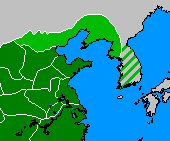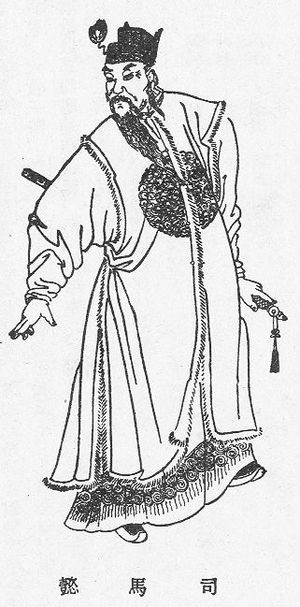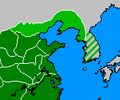Sima Yi facts for kids
Quick facts for kids
Sima Yi
|
|||||
|---|---|---|---|---|---|
| 司馬懿 | |||||
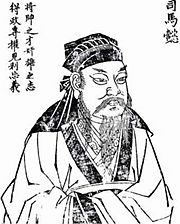
A Ming dynasty illustration of Sima Yi
|
|||||
| Grand Tutor (太傅) | |||||
| In office 13 March 239 – 7 September 251 |
|||||
| Monarch | Cao Fang | ||||
| Preceded by | Zhong Yao | ||||
| Succeeded by | Sima Fu | ||||
| Manager of the Affairs of the Masters of Writing (錄尚書事) | |||||
| In office 22 January – 13 March 239 |
|||||
| Monarch | Cao Fang | ||||
| Succeeded by | Cao Shuang | ||||
| Palace Attendant (侍中) | |||||
| In office 22 January – 13 March 239 |
|||||
| Monarch | Cao Fang | ||||
| In office 221–226 |
|||||
| Monarch | Cao Pi | ||||
| Grand Commandant (太尉) | |||||
| In office 13 February 235 – 13 March 239 |
|||||
| Monarch | Cao Rui / Cao Fang | ||||
| Preceded by | Hua Xin | ||||
| Succeeded by | Man Chong | ||||
| General-in-Chief (大將軍) | |||||
| In office 16 March 230 – 13 February 235 |
|||||
| Monarch | Cao Rui | ||||
| Preceded by | Cao Zhen | ||||
| Succeeded by | Cao Yu | ||||
| Chief Controller of Jing and Yu Provinces (荊、豫州牧) | |||||
| In office July 227 – 16 March 230 |
|||||
| Monarch | Cao Rui | ||||
| General of Agile Cavalry (驃騎將軍) | |||||
| In office January or February 227 – 16 March 230 |
|||||
| Monarch | Cao Rui | ||||
| General Who Pacifies the Army (撫軍將軍) | |||||
| In office 224 – January or February 227 |
|||||
| Monarch | Cao Pi / Cao Rui | ||||
| Right Supervisor of the Masters of Writing (尚書右僕射) | |||||
| In office 221–226 |
|||||
| Monarch | Cao Pi | ||||
| Palace Assistant Imperial Clerk (御史中丞) | |||||
| In office 220–221 |
|||||
| Monarch | Cao Pi | ||||
| Master of Writing (尚書) | |||||
| In office 220 |
|||||
| Monarch | Cao Pi | ||||
| Major to the Army of the Chancellor (丞相軍司馬) | |||||
| In office 219–220 |
|||||
| Monarch | Emperor Xian of Han | ||||
| Chancellor | Cao Cao | ||||
| Master of Records to the Chancellor (丞相主簿) | |||||
| In office 215–? |
|||||
| Monarch | Emperor Xian of Han | ||||
| Chancellor | Cao Cao | ||||
| Senior Clerk for Literary Scholarship (文學掾) | |||||
| In office 208–? |
|||||
| Monarch | Emperor Xian of Han | ||||
| Chancellor | Cao Cao | ||||
| Personal details | |||||
| Born | 179 Wen County, Henei Commandery, Han Empire |
||||
| Died | September 7, 251 (aged 71–72) Luoyang, Wei dynasty |
||||
| Resting place | Mengjin County, Henan | ||||
| Spouse | Zhang Chunhua | ||||
| Domestic partners | Lady Fu Lady Zhang Lady Bai |
||||
| Children | Sima Shi Sima Zhao Sima Liang Sima Zhou Sima Jing Sima Gan Sima Jun Sima Rong Sima Lun Princess Nanyang Princess Gaolu |
||||
| Parent |
|
||||
| Relatives |
|
||||
| Occupation | Military general, politician, regent | ||||
| Courtesy name | Zhongda (仲達) | ||||
| Temple name | Gaozu (高祖) | ||||
| Peerage | Marquis of Wuyang (舞陽侯) |
||||
|
|||||
| Sima Yi | |||||||||||||||||||||||||||||||
|---|---|---|---|---|---|---|---|---|---|---|---|---|---|---|---|---|---|---|---|---|---|---|---|---|---|---|---|---|---|---|---|
| Traditional Chinese | 司馬懿 | ||||||||||||||||||||||||||||||
| Simplified Chinese | 司马懿 | ||||||||||||||||||||||||||||||
|
|||||||||||||||||||||||||||||||
| Courtesy name | |||||||||||||||||||||||||||||||
| Traditional Chinese | 仲達 | ||||||||||||||||||||||||||||||
| Simplified Chinese | 仲达 | ||||||||||||||||||||||||||||||
|
|||||||||||||||||||||||||||||||
Sima Yi (Chinese: 司馬懿; 179 CE – 7 September 251 CE), also known by his courtesy name Zhongda, was a very important military general and politician in ancient China. He served the state of Cao Wei during the Three Kingdoms period.
He started his career in 208 under Cao Cao, a powerful leader of the Han dynasty. Sima Yi quickly rose through the ranks. He was great at managing government, helping with farming, and defending against attacks from rival states like Shu and Wu. He also quickly stopped the Xincheng Rebellion and conquered the Liaodong region. He became famous for defending Wei against many invasions led by Zhuge Liang, a brilliant strategist from Shu, between 231 and 234.
In 239, after the death of Emperor Cao Rui, Sima Yi became a co-regent for the young emperor Cao Fang, sharing power with Cao Shuang. At first, they got along, but Cao Shuang became corrupt and tried to reduce Sima Yi's power. In 249, Sima Yi carefully planned a coup d'état and removed Cao Shuang from power, executing him and his allies.
After this, Sima Yi became the main leader in Wei. He died on September 7, 251, at about 71 or 72 years old. His eldest son, Sima Shi, took over his position. The Sima family gained more and more power in Wei. This eventually led to the creation of the Jin dynasty in 266 by Sima Yi's grandson, Sima Yan. After becoming emperor, Sima Yan honored his grandfather with the special title Emperor Xuan of Jin.
Contents
Sima Yi's Family Background
Sima Yi's family came from Wen County in Henei. His family had a long history of serving as officials. His great-great-grandfather, Sima Jun, was a general. His grandfather, Sima Jun, was a Grand Administrator. Sima Yi's father, Sima Fang, was also a high-ranking official.
Sima Yi was the second of eight brothers. All eight brothers had courtesy names that ended with the word da. Because of this, they were known as the "Eight Das."
Early Life and Talents
Sima Yi was very smart and ambitious from a young age. He knew a lot about Confucianism and ancient Chinese books. When China was in chaos, he felt sad for the people. A talent scout named Yang Jun called him an "extraordinary talent." Another friend said Sima Yi was "intelligent, decisive, and unique."
Sima Yi's family lived in the capital city, Luoyang. In 190, a warlord named Dong Zhuo moved the capital. Sima Yi's family had to move back to their hometown. They lived as farmers for a while, fighting off bandits and studying hard.
Around 201, Sima Yi was asked to work for the government. In 202, he was sent to the capital. Around this time, he married Zhang Chunhua. The powerful warlord Cao Cao heard about Sima Yi's talents and wanted him to join his team. Sima Yi first refused, pretending to be very sick. He didn't want to serve the Han Empire because he thought its future was not good.
Serving Under Cao Cao
In 208, Cao Cao became the Imperial Chancellor. He sent someone to force Sima Yi to join his government. Sima Yi was scared and accepted. He worked in different important roles, like assistant clerk and registrar.
Advising Cao Cao on Military Moves
In 215, Sima Yi went with Cao Cao on a military campaign. After winning a battle, Sima Yi told Cao Cao to attack Liu Bei's territory, Yi Province. He said Liu Bei had just taken control and wasn't strong yet. But Cao Cao didn't listen.
Sima Yi also advised Cao Cao to take the throne from the Han emperor. He said the Han dynasty was weak and Cao Cao controlled most of the empire. But Cao Cao chose not to become emperor.
Sima Yi became a close advisor to Cao Cao's son, Cao Pi. Cao Pi respected Sima Yi's intelligence. Sima Yi helped Cao Pi become his father's chosen heir. He also advised Cao Cao to store up food supplies for the people, which Cao Cao did.
The Battle of Fancheng
In 219, during the Battle of Fancheng, Cao Cao's general Cao Ren was under attack by Guan Yu's forces. Sima Yi had warned Cao Cao about two officials who might betray them, and they did, making Cao Ren's situation worse.
Cao Cao thought about moving the capital because it was too close to the enemy. Sima Yi and another official, Jiang Ji, told him not to. They said moving the capital would show weakness and cause panic. They also suggested that Cao Cao should encourage Sun Quan (another rival leader) to attack Guan Yu. Cao Cao listened to them. Sun Quan's general Lü Meng attacked Guan Yu's territory, which helped lift the siege on Fancheng. Guan Yu was captured and executed.
Sima Yi also advised Cao Cao not to move people from Jing Province further north. He said it would make them unhappy. Cao Cao listened, and the people were able to return to their normal lives after the battle.
When Cao Cao died in 220, Sima Yi helped manage the funeral. He made sure everything was orderly, which earned him respect.
Serving Under Cao Pi
After Cao Pi became the new King of Wei in 220, he gave Sima Yi important titles. Sima Yi continued to advise him.
When Sun Quan attacked Cao Pi's land, some officials wanted to give up certain cities. Sima Yi argued against it, saying these cities were important for defense. Cao Pi ignored him, but later regretted it when Sun Quan didn't attack as Sima Yi had predicted.
In late 220, Cao Pi became emperor, ending the Han dynasty and starting the state of Wei. Sima Yi was given more high-ranking positions and noble titles. He was put in charge of 5,000 troops and managed important government affairs. Cao Pi trusted Sima Yi greatly, telling him, "When I am in the east, you will be in charge of the west; when I am in the west, you will be in charge of the east."
In 226, when Cao Pi became very sick, he called Sima Yi and other top generals to his side. He asked them to help his son, Cao Rui, who would become the next emperor.
Serving Under Cao Rui
After Cao Rui became emperor, he gave Sima Yi the title "Marquis of Wuyang." Sima Yi continued to lead Wei forces.
Defeating Wu Invaders
Around this time, Sun Quan attacked Wei territories. Sima Yi led Wei forces to fight back. He defeated Sun Quan's generals and killed many enemy soldiers. For his success, Cao Rui promoted Sima Yi to General of Agile Cavalry.
Stopping Meng Da's Rebellion
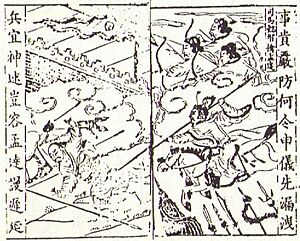
In 227, Sima Yi was stationed at Wan and put in charge of military matters in Jing and Yu provinces. Sima Yi had previously warned that Meng Da, a former Shu general who had joined Wei, was not trustworthy. Sima Yi was proven right when Meng Da planned to rebel against Wei.
Sima Yi acted quickly. He wrote a friendly letter to Meng Da to make him think Sima Yi wasn't suspicious. Then, Sima Yi secretly gathered his troops and marched very fast to attack Meng Da's base. His speed surprised Meng Da, who didn't expect Sima Yi to arrive so quickly. Sima Yi's forces surrounded Meng Da's city. After more than two weeks, Meng Da's own nephew and a subordinate opened the city gates and surrendered. Meng Da was captured and executed. Sima Yi returned victorious.
Managing Jing and Yu Provinces
While in charge of Jing and Yu provinces, Sima Yi encouraged farming and reduced wasteful spending. The people were happy with his leadership. He also dealt with other rebellious officials and helped thousands of people who had moved from Shu to Wei to register as citizens.
Sima Yi also advised Cao Rui on military strategy. He suggested attacking Eastern Wu at key locations, which Cao Rui agreed with.
Campaign Against Shu
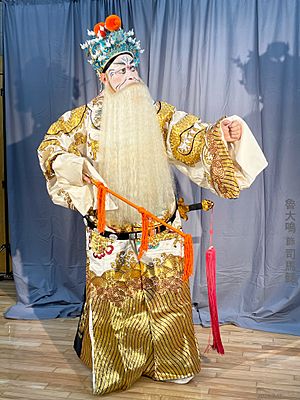
In 230, Sima Yi was promoted to General-in-Chief. He and Cao Zhen were put in charge of defending Wei's western borders from attacks by Shu. Cao Zhen proposed a campaign against Shu, and Sima Yi also led an army towards Shu. However, the campaign had to be stopped because the roads were too damaged and there was heavy rain.
Battles at Mount Qi
In 231, Shu forces led by Zhuge Liang attacked Wei territory. Cao Rui ordered Sima Yi to oversee the military operations. Sima Yi led Wei forces to relieve the besieged Wei troops.
Zhuge Liang's army was collecting wheat in the area. Sima Yi's officers wanted to attack immediately, but Sima Yi waited, knowing Zhuge Liang would first fortify his camp. Sima Yi arrived quickly and Zhuge Liang's forces retreated.
Later, Sima Yi faced Zhuge Liang again. Sima Yi's subordinates urged him to attack, and he eventually did. However, the Wei forces suffered a defeat, losing many soldiers and equipment. Despite this, Zhuge Liang's army ran low on supplies and had to retreat. Sima Yi pursued them. During the pursuit, Zhang He, one of Sima Yi's generals, was killed in an ambush. Even with this setback, Cao Rui rewarded Sima Yi for his efforts.
Sima Yi then focused on improving food supplies in the region. He had farmers from other areas move to Shanggui County to grow more food, which helped supply the Wei army.
Battle of Wuzhang Plains
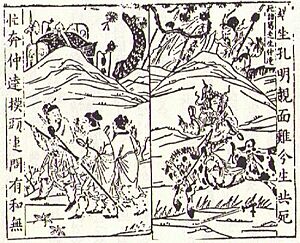
In 234, Zhuge Liang led a large Shu army to the Wei River. Sima Yi positioned his troops carefully, building strong defenses. The Wei emperor, Cao Rui, ordered Sima Yi to stay in his defensive position and avoid direct battle. Zhuge Liang tried to provoke Sima Yi into attacking, even sending him women's ornaments to mock him. Sima Yi pretended to be angry and asked the emperor for permission to attack, but it was denied. This showed his soldiers he was ready to fight, even if he couldn't.
Sima Yi knew Zhuge Liang was working very hard and not eating or sleeping much. He predicted Zhuge Liang wouldn't last long. After a long standoff of over 100 days, Sima Yi heard that Zhuge Liang had died from illness and the Shu army was retreating. Sima Yi pursued them. When he saw the abandoned Shu camp, he realized Zhuge Liang was truly dead. He famously said, "I can predict the thoughts of the living but I can't predict the dead's."
In 235, Sima Yi was promoted again. He also helped transport grain to help people during a famine.
Liaodong Campaign
In 236, a warlord named Gongsun Yuan in Liaodong rebelled against Wei. In 238, Cao Rui ordered Sima Yi to lead a campaign against him. Sima Yi took 40,000 men. He predicted that Gongsun Yuan would try to resist him.
When Sima Yi reached Liaodong, Gongsun Yuan's generals tried to stop him at the Liao River. Sima Yi used a clever trick: he sent a small group of soldiers with flags and drums to make it look like a large attack in one place. While the enemy was distracted, Sima Yi secretly crossed the river somewhere else and marched towards Gongsun Yuan's capital, Xiangping. Gongsun Yuan's generals rushed back but were defeated. Sima Yi then besieged Xiangping.
Heavy rains caused floods, but Sima Yi refused to move his camp. He knew the flood would make it hard for the enemy to get supplies. He also didn't let his soldiers attack small groups of enemy foragers, because he wanted the enemy to stay trapped in the city and run out of food.
Gongsun Yuan tried to surrender, but Sima Yi refused anything less than an unconditional surrender. He executed Gongsun Yuan's messengers, saying there was no need for hostages or more talks. The city ran out of food, and on September 29, Xiangping fell. Gongsun Yuan and his son tried to escape but were caught and killed.
After the victory, Sima Yi ordered a purge of 2,000 officials who had served Gongsun Yuan. He also freed Gongsun Gong, the previous ruler who Gongsun Yuan had imprisoned. Sima Yi allowed families who wanted to return to central China to do so.
When Sima Yi returned to Luoyang, Cao Rui celebrated his victory. Sima Yi was given more land and honors.
Becoming a Regent
Sima Yi sensed that Emperor Cao Rui was very ill. He rushed back to Luoyang and found the emperor dying. Cao Rui held Sima Yi's hand and entrusted his young son, Cao Fang, to Sima Yi's care. Cao Rui appointed Sima Yi as a co-regent for Cao Fang, along with the general Cao Shuang.
Serving Under Cao Fang
In 239, Cao Fang became the new Wei emperor. Sima Yi and Cao Shuang were the regents, each commanding 3,000 troops. Cao Shuang, however, wanted more power. He tried to move Sima Yi to a position that sounded important but had little real authority. Sima Yi was made Grand Tutor, a very honorable title, but it removed him from direct control over government affairs. However, Sima Yi still kept some influence by having his allies in key positions.
Sima Yi also advised the new emperor to stop expensive palace building projects and focus on farming instead, which was approved.
Battles in Jing Province
In 241, Eastern Wu launched attacks on Wei. Sima Yi asked to lead troops to fight them. Other officials thought it wasn't urgent, but Sima Yi disagreed, saying the situation was dangerous.
Sima Yi led his army from Luoyang. He sent light cavalry to bother the Wu forces while his main army stayed ready. He also sent reinforcements into the besieged city of Fancheng. Hearing this, the Wu forces retreated overnight. Sima Yi pursued them, defeating them and capturing their boats and equipment. Cao Fang rewarded Sima Yi with more land and honors. Sima Yi remained humble despite his great achievements.
Improving Farming in Huai River Region
Around 242, Sima Yi suggested building a canal to connect the Yellow and Bian rivers. This would help bring water to farm areas north of the Huai River. This project was completed and helped Wei troops move quickly and have plenty of food supplies when fighting in the southeast.
Later, Sima Yi led an army to attack Zhuge Ke, a Wu general. Many officials advised against it, saying Zhuge Ke's base was too strong. Sima Yi disagreed, believing that Wu forces were better at naval warfare than land battles. He thought they would abandon their land base if attacked. He was right; Zhuge Ke burned his supplies and retreated. Sima Yi then focused on large-scale farming and irrigation projects in the region.
Power Struggle with Cao Shuang
As co-regents, Cao Shuang tried to gain more power for himself and his family. He promoted his brothers and friends and tried to silence anyone who opposed him. He even moved the Empress Dowager to a different palace so she couldn't interfere. Sima Yi was unable to stop all of Cao Shuang's actions, and their relationship became very strained.
In 244, Cao Shuang ignored Sima Yi's advice and launched a military campaign against Shu, which ended in a defeat for Cao Shuang. Sima Yi warned him that his reckless actions could lead to disaster.
In 247, Sima Yi pretended to be very ill and withdrew from politics. Cao Shuang and his allies thought Sima Yi was dying and no longer a threat.
The Incident at Gaoping Tombs
On February 5, 249, Cao Shuang and his brothers went with the emperor Cao Fang to visit a tomb. Sima Yi used this chance to stage a coup d'état (a sudden takeover of power). He went to the Empress Dowager and got an order to remove Cao Shuang from power. Sima Yi's eldest son, Sima Shi, led 3,000 soldiers to take control of the palace gates.
Sima Yi then sent a message to Emperor Cao Fang, listing Cao Shuang's crimes and asking for him to be removed. Cao Shuang tried to block the message and set up defenses. Sima Yi sent trusted people to persuade Cao Shuang to surrender, promising that he would only lose his power, not his life. Cao Shuang eventually surrendered, believing he could still live a rich life in retirement.
However, after returning to Luoyang, Cao Shuang and his allies were arrested. On February 9, 249, they were accused of treason and executed along with their families. Sima Yi refused to spare them.
Sima Yi was offered the position of Imperial Chancellor and more honors, but he humbly declined some of them. Because Sima Yi was often ill, Emperor Cao Fang frequently visited him to ask for his advice.
Stopping Wang Ling's Rebellion
In 251, Wang Ling, a high-ranking official, and his nephew plotted to replace Emperor Cao Fang and overthrow Sima Yi. Sima Yi quickly learned of the plot. He immediately gathered troops and marched to attack Wang Ling. Sima Yi's fast movement surprised Wang Ling, who realized his forces were too weak. Wang Ling surrendered.
Sima Yi had Wang Ling and his co-conspirators arrested and executed. However, he pardoned two of Cao Shuang's former subordinates, saying they were just serving their master. He also made an exception for Guo Huai's wife, who was Wang Ling's sister, after Guo Huai's sons pleaded for her.
Sima Yi was offered more high titles, including Chancellor of State and Duke, but he declined them. He also moved other members of the Cao family to Ye, effectively placing them under house arrest.
Death and Honors
In July 251, Sima Yi became very ill. He died on September 7, 251, in Luoyang, at the age of 73. Emperor Cao Fang attended his funeral and ordered Sima Yi to be buried with great honors. Sima Yi had asked to be buried simply, without a tombstone or luxury items.
After Sima Yi's death, his eldest son, Sima Shi, took over his power. When Sima Shi died, his second son, Sima Zhao, took his place. In 266, Sima Yi's grandson, Sima Yan, took the throne from the Wei emperor and established the Jin dynasty. Sima Yan honored his grandfather with the special title "Emperor Xuan of Jin."
Interesting Stories About Sima Yi
- When Sima Yi was young, he was kidnapped. His friend, Hu Zhao, bravely went to rescue him. Hu Zhao cried and pleaded with the kidnapper until Sima Yi was released. Hu Zhao never told anyone about this, and few knew Sima Yi owed him his life.
- Once, Cao Cao heard Sima Yi had a special way of looking back over his shoulder without turning his body. Cao Cao wanted to see it for himself. He told Sima Yi to walk in front of him and then asked him to look back. Sima Yi turned only his head, proving the story true. Cao Cao also had a dream that made him worry about Sima Yi's ambition.
- In his later years, Sima Yi started to favor his concubine over his wife, Zhang Chunhua. When Sima Yi was sick, Zhang Chunhua visited him, and he said something mean about her appearance. She got angry and tried to starve herself. Her children joined her. Sima Yi quickly apologized and made up with her. He later secretly said he wasn't worried about his wife, but about his sons!
What People Thought of Sima Yi
In 238, when Gongsun Yuan heard Sima Yi was coming to attack him, he asked for help from Eastern Wu. The Wu emperor, Sun Quan, said Sima Yi was a brilliant military strategist who defeated everyone in his path.
After Sima Yi took power from Cao Shuang, an official named Wang Guang said Sima Yi was hard to understand but always did what was right for the country. He gave jobs to capable people and worked hard day and night to help the people.
Later, an emperor of the Eastern Jin dynasty, who was a descendant of Sima Yi, asked about the Jin dynasty's origins. When he heard how Sima Yi took power, he wondered how the dynasty could last long, showing that some people questioned the way the Sima family gained control.
A historian from the Tang dynasty, Fang Xuanling, wrote that Sima Yi seemed generous but was actually distrustful and jealous. He was known for being suspicious, calculating, and good at political tricks. He also noted Sima Yi's cruelty, like executing 2,000 people in Liaodong and killing Cao Shuang's entire family.
Sima Yi in Stories and Games
Sima Yi is a major character in the famous 14th-century novel Romance of the Three Kingdoms. In the novel, he pretends to be a loyal servant while secretly planning for his family to take over the throne. He is also shown as the main rival to Zhuge Liang, with both of them constantly trying to outsmart each other in battles.
Sometimes, Sima Yi is honored as a door god in Chinese and Taoist temples, often alongside Zhuge Liang.
Sima Yi also appears as a playable character in video games like Dynasty Warriors and Warriors Orochi.
Images for kids
- Family tree of Sima Yi
- Lists of people of the Three Kingdoms
See also
 In Spanish: Sima Yi para niños
In Spanish: Sima Yi para niños
 | William L. Dawson |
 | W. E. B. Du Bois |
 | Harry Belafonte |


